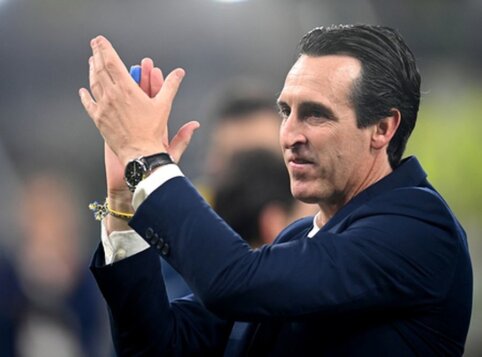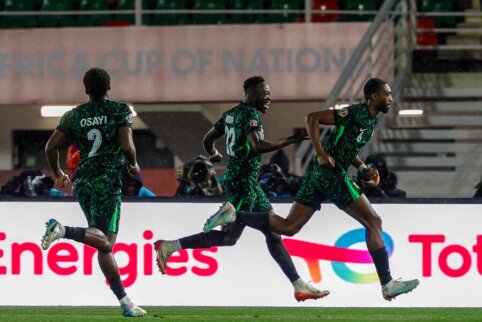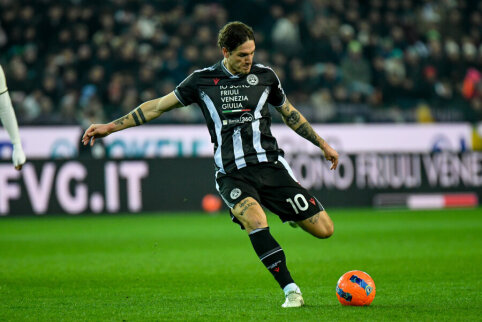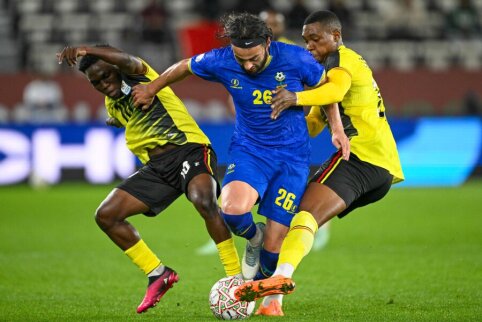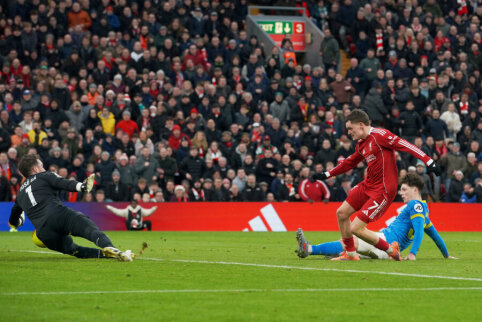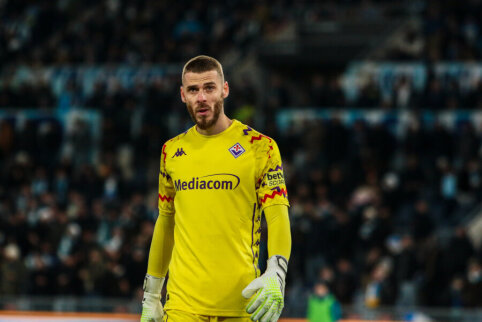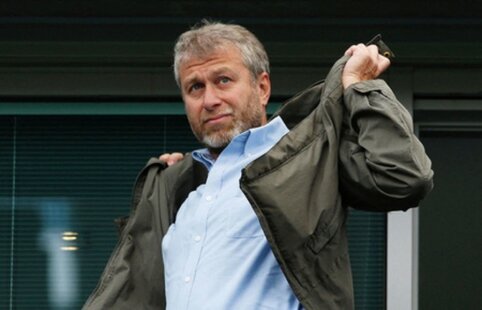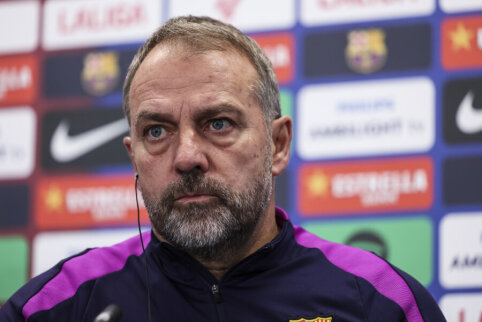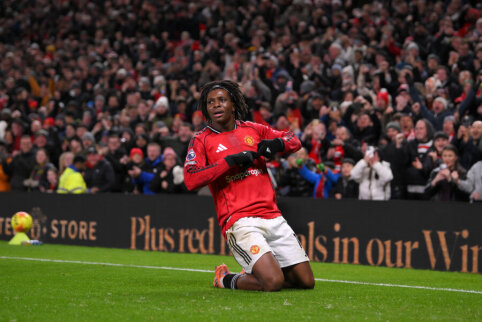 © EuroFootball.com
© EuroFootball.com
In the column "Tribune" website visitor Nerijus P. introduces the biography of Dennis Bergkamp, a legend of the Netherlands national team and Arsenal, who became famous not only for his extraordinary ability to score unforgettable goals, but also for his fear of flying.
Please note that you can send your articles to [email protected]
Dennis Nicolaas Maria Bergkamp was born in Amsterdam on May 10, 1969. His name was given to him in honor of the famous "Manchester United" player Denis Law, although Dutch officials decided that the name was too similar to "Denise," so Dennis's parents decided to name him Dennis by adding an "n." His whole family were big fans of the Manchester club, but Dennis admired Tottenham player Glenn Hoddle. He wasn't a fan of Tottenham - he was a fan of Hoddle.
Bergkamp at Ajax
At the age of 12, Dennis started attending the Ajax football school. He had extremely intense training - three to four times a week for several hours. Working hard, he hoped to quickly establish himself in the team.
However, the coaches thought that the boy, who was not very well-built and not physically perfect, was not yet ready for the battle on the field. For several years, Bergkamp had to fight for a place even in the youth team.
Nevertheless, the boy's training and hard work did not go unnoticed - Johan Cruyff noticed the young talent, and after spending several years in the youth team, Dennis eagerly awaited his debut in the Ajax team. His first match for Ajax was played on December 14, 1986, and a few months later, in a match against Malmo, he made his debut in Europe.
In the same year, he scored four goals in the Cup Winners' Cup tournament, and Ajax became the champion. In 1990, Bergkamp won the national championship medal, and in 1993, the Dutch Cup.
In the same year, he left Ajax after playing 239 matches and scoring 122 goals.
Beginning of National Team
In 1990, he made his national team debut against Italy. After a few months, he scored his first goal representing his country in a match against Greece. He was a national team member for 10 years until 2000, when, after the European Championship held in his homeland and Belgium, he announced his retirement.
In 1992, the Netherlands traveled to Sweden for the European Championship as favorites. Bergkamp played alongside then Dutch stars like Gullit, van Basten, Rijkaard, and Koeman. During the tournament, Bergkamp scored three goals, but the Netherlands were defeated by Denmark in the semifinals.
Unsuccessful Years in Italy
In 1993, Bergkamp moved to Inter Milan. Cruyff doubted Dennis's ability to play in a defensive team like Inter. With this team, he won the UEFA Cup. He played for the team for several seasons, but, as Cruyff predicted, Bergkamp found it increasingly difficult to adapt to both the style of football and the intrusive journalists and unfriendly teammates. This led to his poor performance in Italy, where he scored only 11 goals in 52 matches.
However, he continued to perform well in the national team - during the 1994 World Cup, he scored three goals in five matches.
Transfer to Arsenal and Best Years of Career
"As soon as I heard the name 'Arsenal,' I immediately wanted to go to London," Bergkamp said at a press conference. On June 20, 1995, Arsenal bought the Dutch star for a record fee of £7.5 million.
It was after signing the contract with Arsenal that Dennis Bergkamp's famous fear emerged - the fear of flying.
"Nothing happened, no one died, no one crashed, I just realized that during the matches I was thinking too much about flying back and forth, and it affected my game," he said.
It was then that he gained his famous nickname - the "Non-Flying Dutchman."
His first season at Arsenal was tough but successful. At the beginning of the season, Bergkamp's performance raised concerns, and critics enjoyed every "dry" game he played. Finally, in his eighth match for Arsenal, he scored two goals against Southampton and silenced the critics. Bergkamp fit in well with the team. One of his best friends on and off the field was attacking partner Ian Wright.
After a couple of seasons at Arsenal, in 1997-1998, Bergkamp was at the peak of his career. Coach A. Wenger, recalling that season, said: "He was incredible, sometimes it seemed like he could score a goal from any situation with one touch, while others wouldn't manage to do it even with two touches. At that time, he probably had no equals."
"My body moved perfectly, it listened to every move of mine. Every touch was like a prelude to a goal. That was probably the best season of my career because everything I did seemed to work," the player said.
He helped his team win the Premier League and FA Cup.
In the 1998 World Cup in France, Bergkamp played exceptionally well. Again, three goals, including one of the most impressive in the history of the tournament against Argentina, and three assists. However, the Netherlands were eliminated again, this time in the semifinals after losing to Brazil on penalties.
The start of the new season in the Premier League was not as successful as the previous one. Constant injuries prevented him from getting into the rhythm of the game. However, after recovering a few months later, he played well with another Arsenal striker, Nicolas Anelka. The end of the season was dramatic - a battle until the last minute with Man Utd and a lost fight for the title.
Dennis had unpleasant moments in his career. One of the worst episodes Bergkamp mentioned was in the FA Cup semifinal match of the same season against the same Man Utd team. At that time, Peter Schmeichel saved Bergkamp's shot from the penalty spot, and shortly after, Ryan Giggs scored a beautiful goal with a solo run, knocking Arsenal out of the title race.
End of National Team
Before the start of the European Championship in Belgium and the Netherlands, Bergkamp announced that it would be his last tournament representing the Oranje. So, it was his last chance to win something. However, once again, penalties stood in his way. The Netherlands fell in the semifinals. In this championship, Bergkamp did not score goals, but he demonstrated all his good qualities and creator skills, turning them into assist goals.
He ended his national team career as the second-highest goalscorer (37 goals in 79 matches), behind only Patrick Kluivert.
Arsenal Career (Continuation)
At the start of the 2000-2001 season, he could focus all his attention on Arsenal. The first matches were not great, but Bergkamp soon hit his stride and was pushed to play as a right winger, which he managed quite well. Mid-season rumors spread that Bergkamp was actively interested in Newcastle, but it was clear he would stay with the Gunners, and he did.
However, an Achilles tendon injury forced him out of the lineup at the end of the season, so he could not help in the final nine matches. Arsenal again finished second, and in the FA Cup final, they lost to their opponents, this time to Liverpool.
The 2001-2002 season was excellent for both Bergkamp and the team. It was the second double for the team: they won the FA Cup final and clinched the final victory in the Premier League. Impressive records were also set - no away losses throughout the season and 13 great wins at the end of the season. Bergkamp was once again one of the main architects of the team's success. He played 46 matches, scored 14 goals, and made numerous great passes.
The 2002-03 season started well for Arsenal with Bergkamp leading the Gunners throughout the season despite a few minor injuries. But a series of four straight losses with the same score (1-2) took the team out of the competition. In early March, Bergkamp played tragically, but the season ended more successfully - a few goals, guaranteeing wins, and a couple of beautiful assists. Arsenal finished second in the Premier League, and the FA Cup was won thanks to Bergkamp.
Bergkamp scored his 100th goal playing for Arsenal in the FA Cup third-round match against Oxford. A month later, in a match against Liverpool, he celebrated his inclusion in Arsenal's squad for the 300th time.
The 2003-04 season saw Bergkamp play his final season as many fans believed he would retire after wearing the Gunners' jersey. They were wrong. The Dutchman extended his contract with Arsenal for another year. "This contract shows what each side means to each other," said A. Wenger.
He missed some matches at the beginning of the season due to injuries, but in the second match, where he captained the team, Bergkamp managed to score, one of the five goals he scored that season. Arsenal secured a champion's title in a match against Tottenham at their stronghold. The match ended in a 2-2 draw, but the true winners were Arsenal with Dennis, who played a crucial role in creating both Arsenal goals. In the final season match against Leicester, Bergkamp delivered an excellent assist to Patrick Vieira, who scored the winning goal for Arsenal, sealing the fact that Arsenal did not lose that season.
Arsenal took the opportunity to extend Bergkamp's contract until the end of the 2004-05 season. That season was not very successful for Dennis, as he lacked youthful agility in some situations. However, unable to score many goals, he tried his best to lift the team as much as possible. His emotional support was successful - for several seasons, he tried to emotionally uplift the team. Arsenal, inspired by Bergkamp, set a new record - 49 unbeaten league matches!
However, injuries overshadowed Bergkamp, and he had to give way to younger players like Jose Reyes and Robin van Persie. Still, he played impressive games against Everton, which the Gunners won 7-0. Dennis made three assists, and in the second half, he scored a goal himself. This goal set Highbury on fire - the whole stadium chanted "One more year," these chants echoed for several minutes - Highbury wanted the "Non-Flying Dutchman" to stay in the Gunners.
After these matches, the final contract between Dennis and Arsenal was signed. "I cannot be indifferent to those fantastic fans; I will extend the contract for the last time because I love them and want to remain part of this great atmosphere," Bergkamp said.
As known, the "Non-Flying Dutchman" has played his farewell match. It was indeed his last contract as a footballer... In 423 matches for Arsenal, he scored 120 goals, many of them are simply of rare beauty. The gigantic footprint that Dennis left in the history of football and Arsenal will remind us of his exceptional talent and leadership ability even in the toughest moments....




